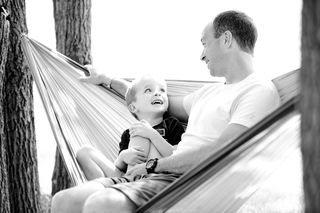Forgiveness
How You Can Apologize to Your Children, or Should You?
Apologies to Kids Can Mend the Disruption of the Divorce
Posted April 21, 2019
In my previous post, I wrote about how to make a good apology. This led to a conversation with a colleague, Liz Salin, MFT., regarding apologies in families, and in particular during a divorce. Liz Salin is a psychotherapist and divorce coach in the San Francisco Bay Area. Apologies between parents and children need special consideration and have unique and sensitive issues. I thought I would share my thoughts and takeaways from my conversation with Ms. Salin.
Stories
Story: Marian (not her real name) had to deal with the death of her mother when her husband filed for divorce. Marian was overwhelmed with grief and scarcely noticed that her 12-year-old son was “shutting down.” She told me, “After some months I realized how sorry I was that I wasn’t very much fun or available to my son. I didn’t help him understand what was going on. I thought he might be worried about me. Because I didn’t want to burden him, I avoided talking about it, hoping it would “get better soon.” I wish I could have said ‘I am so sorry that this is such a difficult time for you. I am grieving, which is a normal experience. It’s intense and maybe confusing or scary to see me being upset. You don’t need to take care of me. I have good support, but it would be great for you to keep being a good kid, stay connected with school and friends.’ Later I was able to tell him how lost I got after my ex and I separated, tell him about my anger and grief, how my energy went to anger and I couldn’t settle myself down enough. I said, ‘You lost me when I fell into all my feelings of grief, I am so sorry it was scary for you.’” If you can name it, you can contain it.

Another story: Daniel, a dad to two young children, and an alcoholic, worked with a therapist to develop an apology for his drinking, and his rages when drunk. He wanted to reassure his children about his ongoing work in sobriety. With a therapist, he was able to work through a process of taking responsibility for his behaviors. Then he was able to focus on his children’s felt loss of the sober, attentive dad they had had in the past. Daniel was able to acknowledge that when he was drunk he was scary, abusive, and hostile. In recovery, he regained his ability to provide safety and security to his children. The apology was a way for his children to see him focusing on their needs which were ignored when he was drinking. His apology helped repair the interrupted secure attachment. It helped the kids feel that “Dad really does know me after all.” It felt like they got their father back.
How Does the Divorce Affect Parent-child Relationships?
I now work primarily with families who commit to resolving their divorce outside of court. At the opposite extreme are multi-problem families where the children refuse or resist contact with one of their parents. I stopped taking those cases a few years ago because it was so painful to see how the children suffered.
In all families, high-conflict or not, relationship problems between parents and children are often exacerbated by the divorce. Emotions run hotter for everyone, and the kids are often scared, confused, angry or disappointed in one or both parents. The relationship between children and their parents is almost always affected. Liz and I explored the idea of how parents might apologize to their children.
During their separation or their estrangement, parents understandably are preoccupied with their own emotions. They are dealing with grief, anger, anxiety and many other feelings, amplified by worries about the future. This can unintentionally lead to a lack of sensitivity to their children’s experience, or “inaccurate empathy” (assuming the children feel the same way they do).
Stressed parents love and care about their children’s welfare, but are not necessarily “attuned” to their children’s emotional state. Parents may forget that children also have mixed feelings and intense loyalty conflicts. During the stress of separation and divorce, and after the divorce is final, parents’ sensitivity may be clouded by thinking the kids’ concerns are bogus or driven by the other parent. As a result of not being aware of their kids’ experience, or being in denial about the kids' distress, parents may become highly defensive. They may not recognize the signs of distress in their kids and dismiss or disregard their thoughts and feelings. To avoid feeling guilty they may not be able to connect the children’s emotional or behavioral changes to the divorce experience. They may attribute the changes to "attitude problems."
Seeing the parents’ relationship fail can lead children to the conclusion that the situation is hopeless, or that a parent is vulnerable and needs care. Older children may have moral judgments about their parents. Teens may be disappointed or angry for a parent’s “moral failings.” Often these kids avoid their feelings and avoid talking about them with their parents. They may hide their feelings, thinking they need to take care of their parents or recognizing that their parents are not truly present. Younger children may regress; teenagers might internalize their feelings, or externalize them and develop behavioral problems. Children who aren’t directly expressing their emotions dovetail perfectly with the parents’ belief that “the kids are fine.”
Preparing to Apologize
It can be overwhelming for parents to acknowledge that their children may be having much more complicated reactions to parental discord or conflict. If parents can recognize that this is happening, they might see the importance of an apology.
The apology carries a welcome potential for healing. An apology will help the parent reduce her own defensiveness. It will increase empathy, and help the children detach from parental friction. The kids will feel deeply and accurately seen and the disrupted attachment can be repaired.
Liz Salin describes a process she calls “evoking an empathic experience.” The goal is to imagine the children’s experience from their position and to imagine it from as many perspectives as possible.
If you are considering an apology to your child, take some time to try to imagine as vividly as you can what might make things hard for him. Imagine yourself as a competent caring parent. When you are ready to apologize, they will see you as a sturdy and trusted adult. Try to imagine yourself as a loving parent who made an error and hold this awareness with kindness and lightness. Remember that you don’t have to be perfect. Younger children idealize their parents. Your older child may feel so disappointed in you that even a small misstep or mistake can feel crushing to her. So you and your child will have to give up on the idea that you are perfect, but merely human.
An Apology is a Parenting Tool
An apology is a parenting tool that many parents don’t know they have. It gives parents a way to step back and honor their own feelings as well as their children’s. An apology acknowledges the kids’ experience of what they have lived through. It is important that parents acknowledge their own contribution to this experience. “I realize that I have been so busy with divorce details that I have not been very available to you.” Or “I have been thinking that I have been more impatient with you over the last few months.” This acknowledgment allows children to reconsider their conclusions and mistaken judgments about what is going on in the family without feeling humiliated or disregarded.
While the apology gives validity to the kids’ true experience, it can be given without necessarily agreeing to the children’s perceptions (e.g., “Dad is falling apart and I need to take care of him.”) or accusations (e.g., “You abandoned us and destroyed our family.”) Parents acknowledging the reality of the feelings don’t need to argue with whether the feelings are valid, or based on “truth.
Factors to think about in imagining your child’s experience
Prior to the stress of the divorce, fighting, or addiction, your children probably felt very connected to you. Then they “lose” you when you are caught up in conflict or addiction. The dynamic of having you and losing you, perhaps over and over, is one factor to consider when imagining your child’s experience. The loss of your attention and your own unpredictable emotions are confusing, frightening and painful for children. Other factors to think about in imagining your child’s experience are your children’s ages, context (what is happening in your family), and siblings. Developmental issues are also important. When you reflect on how your child was affected and feels, you need to think about how kids that age think and feel. Little kids are terrified about being left and need concrete information about what’s happening and why, so their imagination doesn’t scare them. All kids need reassurance.
One challenge in divorce situations is how to apologize without blaming the other parent or blaming yourself excessively. Focusing on the other parent or your own shortcomings distracts from your focus on the children’s experience and emotions. It can be tempting to try to “set the record straight” or share your beliefs about what is “true,” but this is rarely reassuring or helpful to children. Acknowledging your behavior is important, and the focus should be on how that affected your children.
How Does a Parent Deliver an Apology to the Children?
A short apology is probably better. Forward thinking and talking about learning to do it better is part of the repair. Your apology expresses regret and your sense of your children’s feelings. (They may correct you.) Then, framing your apology as a learning opportunity is reassuring to children. Saying something like “I’m learning, I didn’t know how to do it right, and we are going to figure out a way that works better for you.” “I’ve been thinking about it and am already learning because I realize it’s been so hard on you. Sometimes it’s ok to take time to learn something but I need to learn it faster because it’s been so upsetting, disappointing, and scary for you. I want to show you that people can learn things and things can get better.” “It must have been scary because you’ve never seen me that mad. You must have wondered 'what’s happening to my mom or who is this guy?'”
Sometimes parents may be able to apologize together to the children. This could be very reassuring and healing for them. If not together, perhaps one parent could reference the other parent: “I talked to your mom (or dad) about this, and we know we used to be able to do that (e.g., “talk without yelling”). I’m glad we were about to talk about it, so we can get better at this.” Or “I’m so glad you talked to your mom (or dad) because when she shared it with me, it helped me learn (or understand) something I didn’t know (or learn more quickly).”
Depending on the ages of your children, and their developmental stage, you might do the apology with all the children together, especially if they all witnessed an upsetting event. You will need to screen out your unintentional pleas for forgiveness so your kids don’t have to take care of you. Your tone should be warm, but matter-of-fact. Your children will feel less overwhelmed if it isn’t a lecture.
Get Support When an Apology is Needed
If the situation is complicated, or you are unsure about how to apologize, a consultation with a coach can help organize your narrative. The preparation work with yourself, your co-parent, or a coach will pave the way for a healing and deeper connection with your children. And as a bonus, your children will benefit from seeing you model an effective apology.
© Ann Buscho, Ph.D. 2019




